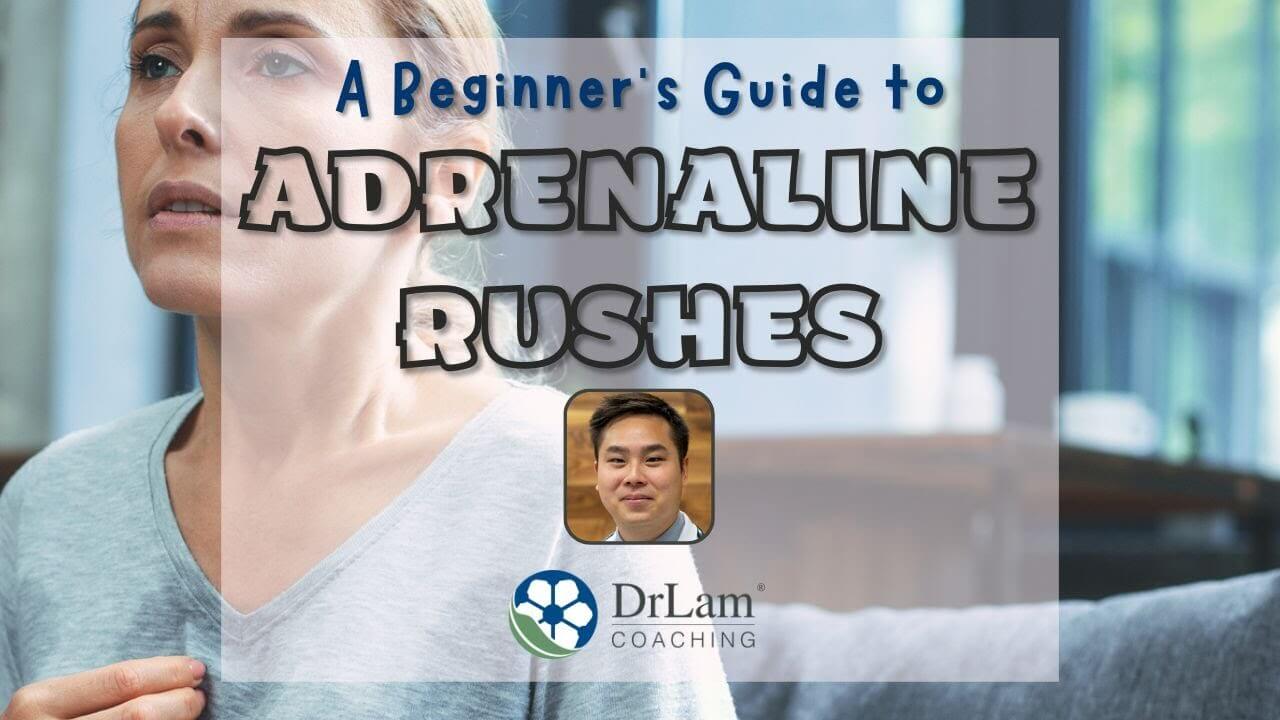
Adrenaline, also known as epinephrine, is the primary hormone responsible for the fight or flight response that is associated with stressful or dangerous situations. Chemically, it is part of the catecholamine family, the members of which are derived from the amino acid tyrosine. The synthesis of adrenaline occurs through a pathway that begins by converting tyrosine into dopamine. Dopamine is then oxidized to form norepinephrine, which is both a locally acting neurotransmitter in the brain and a peripherally acting hormone. In the final step, norepinephrine is converted into epinephrine.
But what does adrenaline do in your body? Adrenaline is released in a part of the adrenal glands that respond directly to the nervous system: the adrenal medulla. It then binds with adrenergic receptors throughout the body, triggering a number of metabolic changes that are intended to stimulate cells to increase energy production and the supply of oxygen to the muscles and thus improve physical and mental performance.
Noradrenaline, or norepinephrine, is also released during the flight or fight response along, although in smaller amounts. Norepinephrine is primarily responsible for the day-to-day housekeeping functions that occur within your body, allowing you to stand up without feeling dizzy, for example. Adrenaline is primarily responsible for reacting when your body perceives stress that is a threat to survival. It is, therefore, a crucial component of the body’s NeuroEndoMetabolic stress response.
 When the body is under stress, the adrenal glands release cortisol under the control and direction of the hypothalamus-pituitary-adrenal (HPA) hormonal axis. Cortisol is the main hormone that controls the way you deal with stress. When it works, you don’t even notice it. However, if stress levels are extremely high or prolonged, you may notice the effects of increased cortisol production as the body attempts to reduce its stress levels. The more the stress you’re under, the more cortisol you produce.
When the body is under stress, the adrenal glands release cortisol under the control and direction of the hypothalamus-pituitary-adrenal (HPA) hormonal axis. Cortisol is the main hormone that controls the way you deal with stress. When it works, you don’t even notice it. However, if stress levels are extremely high or prolonged, you may notice the effects of increased cortisol production as the body attempts to reduce its stress levels. The more the stress you’re under, the more cortisol you produce.
When cortisol is released, your appetite increases, in preparation to bolster your energy levels. At the same time, your immune system’s inflammatory response— is reduced, which speeds healing and wards off infection. Synthetic cortisol, in the form of prednisone or cortisone, is administered for both of these effects, to increase appetite in those who are not eating enough and to reduce inflammation in those with arthritis or other inflammatory diseases. However, excessive cortisol for a prolonged period of time can lead to decreased bone density, muscle wasting, decreased protein synthesis, kidney damage, blood sugar spikes, weight gain, and increased susceptibility to illness. Due to their performance-enhancing properties, steroidal drugs, such as cortisone, are universally banned in professional athletics.
Adrenal glands have a limited ability to produce cortisol. Intense stress and increased cortisol production can result in Adrenal Fatigue, a condition that arises when the adrenal gland can no longer generate the required cortisol due to the lack of nutrients. When this happens, the body’s internal survival system is activated. The sympathetic nervous system triggers a fight or flight response and the body goes into survival mode.
Most hormones work in closed, negative feedback loops that shut off production when the required levels are reached (much like a thermostat). This is not true of adrenaline, however, which is a hormone of last resort. There is no opposing hormone that can neutralize or mitigate its effects. Adrenaline’s effects are therefore hard to counteract. This is why adrenaline can be harmful to your health—even lethal. Unlike other hormones, adrenaline works in a positive feedback loop: the production of adrenaline itself triggers the release of more adrenaline. This leads to an adrenaline rush until the stressful situation is over. Positive loops such as this are inherently unstable and can easily get out of balance.
The adrenaline stress response is effective at dealing with extreme situations, such as when you come face to face with a tiger or wolf. In the modern age, however, the most common stressors are not physical but emotional. This means that, while the danger isn’t as severe, it’s constant. You can flee from tigers, but it’s more difficult to run away from bills and everyday traffic.
Adrenaline affects the cardionomic and neuroaffective systems of the NeuroEndoMetabolic (NEM) stress response. The NEM system is an orchestra of organs and systems working in unison and synchrony to cope with stress. Adrenaline is released only as last resort. As adrenaline courses through your bloodstream, you may start to feel flushed, your heart rate may increase, your blood pressure may be affected, and your hands may sweat. When adrenaline reaches your brain, it stimulates feelings of anxiousness or jitteriness. Adrenaline also increases your sense of awareness, which combined with the increased anxiety, may lead to panic attacks.
There are four progressive stages of Adrenal Fatigue. Adrenaline often reaches peak production in stage 3 (Adrenal Exhaustion). In the early stages of Adrenal Fatigue, you may begin to have trouble sleeping and may notice unusual sleep patterns and occasional tiredness, but this usually resolves with rest. In advanced stages, as your adrenal glands become overwhelmed and produce excessive amounts of adrenaline, you may start to experience the advanced symptoms of Adrenal Fatigue, such as chronic insomnia, heart palpitations, anxiety, panic attacks, etc.
 If you are experiencing adrenal exhaustion, you will still be able to function more or less normally. The symptoms are mild enough to keep pushing through. However, as you continue to do so, the symptoms will become more pronounced. You may start to feel “wired and tired.” You might feel drowsy during the day and wide awake at night. Or you might be able to make it through the day but crash hard in the evening. You may also begin to notice a greater dependence on caffeine or find yourself getting sick more often, as your energy reserves and immune system are both depleted.
If you are experiencing adrenal exhaustion, you will still be able to function more or less normally. The symptoms are mild enough to keep pushing through. However, as you continue to do so, the symptoms will become more pronounced. You may start to feel “wired and tired.” You might feel drowsy during the day and wide awake at night. Or you might be able to make it through the day but crash hard in the evening. You may also begin to notice a greater dependence on caffeine or find yourself getting sick more often, as your energy reserves and immune system are both depleted.
As time goes by, and you continue to push your limits, the fatigue can become debilitating. It will become more difficult to wake up in the morning and fall asleep at night. You may experience depression, irritability, or anhedonia (loss of interest in the hobbies and pastimes you used to enjoy). This is often referred to as “burnout.” This occurs when your adrenal glands have shut down and are no longer working properly. To complicate matters, many doctors don’t recognize Adrenal Fatigue as a real condition, and may attempt to treat your symptoms with antidepressants, sedatives, or other drugs. This may keep you going a little longer, but because you haven’t addressed the underlying condition, your symptoms will eventually worsen.
The good news is that recovery is possible. However, it requires a complete lifestyle change, focused on self-care, along with neurotransmitter and hormonal rebalancing, without the use of stimulatory compounds such as glandulars and herbs. The use of steroids should be considered only as a last resort. Recovering from Adrenal Fatigue takes time and patience, and the more advanced the exhaustion, the longer and harder the road to recovery will be.
Start by getting plenty of sleep—at least eight to ten hours a night. Exhaustion is your body’s way of telling you it needs rest. So listen to it.
Eat a diet consisting primarily of whole, fresh, and minimally processed foods. Consume plenty of protein, and spread it throughout the day, rather than having it all at one meal.
Avoid caffeine and limit sugar. If you find yourself suffering from withdrawal symptoms, you may need to gradually wean yourself off these substances.
Take time to breathe and slow down. Taking controlled abdominal breaths every hour can turn on your parasympathetic system to fight the constant barrage of sympathetic activations in your body.
Get plenty of light to moderate exercise, but be careful not to exercise too strenuously. If you feel like you’re pushing your limits, you need to slow down. Strenuous exercise can backfire, further weakening the adrenals.
 Get some sunshine. Spend a few minutes outside in the morning and/or evening. Sun exposure is the best source of vitamin D, which strengthens both your adrenals and your immune system. Avoid the midday sun and don’t stay out long enough to burn.
Get some sunshine. Spend a few minutes outside in the morning and/or evening. Sun exposure is the best source of vitamin D, which strengthens both your adrenals and your immune system. Avoid the midday sun and don’t stay out long enough to burn.
Get your priorities in order. This may well be the hardest step, as a habit of taking on too much is likely what got you into the stressful situation to begin with. Figure out what’s truly important to you, and let the rest go. For those things that must be done, try to delegate to your spouse, children, or someone else whenever possible.
Remember that the body has the ability to heal itself, if given the opportunity and resources to do so. Avoid steroids, unless as a last resort. Be careful with hormones that are designed to stimulate the body in any way, as they can increase further the adrenaline output. Such hormones include DHEA, pregnenolone, testosterone, and estrogen. Stay clear of glandulars and herbs that can have stimulatory effects, including ashwagandha, maca, and rhodiola.
Remember that quick fixes often cause the underlying condition to worsen. Aggressive strategies that are not grounded in clinical experience can easily trigger adrenal crashes that slow the recovery process. Laboratory testing in those with Adrenal Fatigue is not very dependable and can be misleading.
All of this may sound overwhelming, but you don’t have to do it alone. Ask for help. Find a health professional who has experience with Adrenal Fatigue. They will discuss possible recovery strategies with you and help you on the road to recovery.
The answer to the question, what does adrenaline do, is a complex one. The body is a complicated combination of circuits and organs and even helpful chemicals can become dangerous under certain circumstances. Adrenaline is essential for times of stress and danger, but it can also be very damaging at ongoing high levels. If you're struggling with your adrenaline levels and it's disrupting your life, here's what to do:
If you're struggling with AFS or with hormonal imbalances, talk to our team on +1 (626) 571-1234 or by clicking here.
